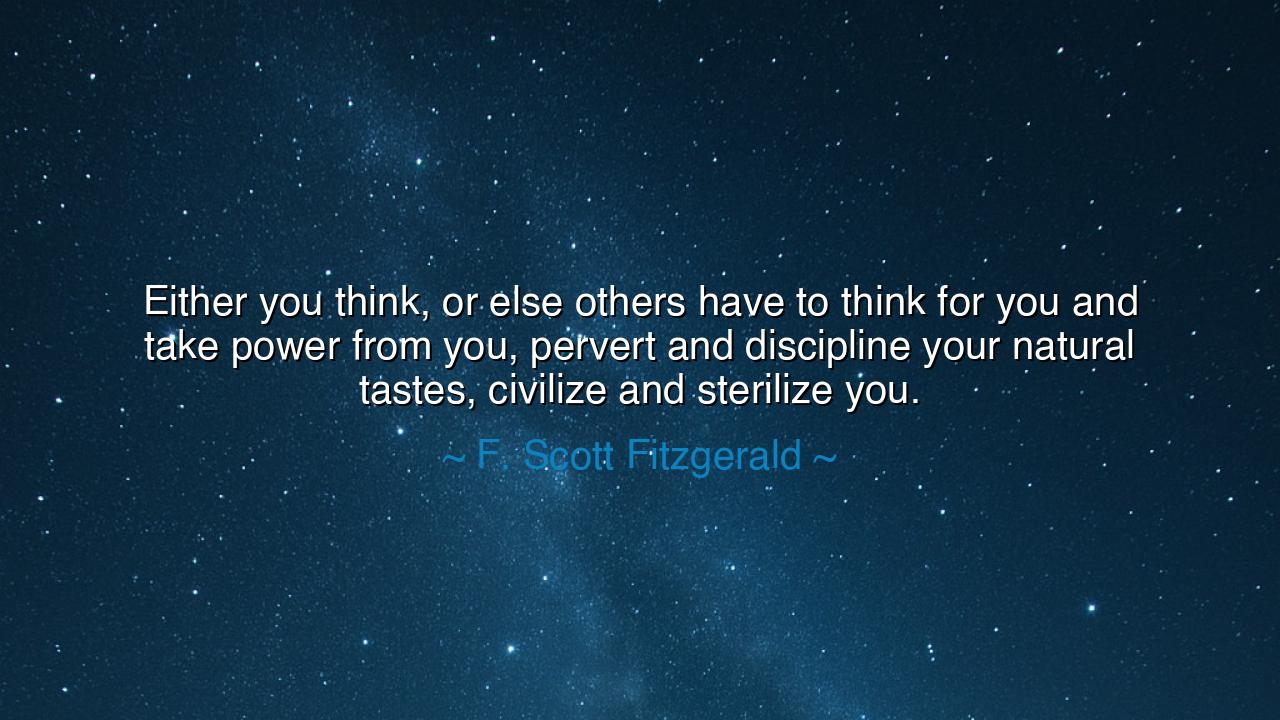
Either you think, or else others have to think for you and take
Either you think, or else others have to think for you and take power from you, pervert and discipline your natural tastes, civilize and sterilize you.






In these impassioned words, F. Scott Fitzgerald speaks to the sanctity of individual thought and the peril of relinquishing it. He warns that if one does not think for oneself, others will seize the authority to dictate one’s mind, robbing the soul of power, distorting natural tastes, and enforcing a rigid conformity that civilizes and sterilizes the human spirit. Fitzgerald reminds us that the greatest danger to freedom lies not in external oppression alone, but in the surrender of our own capacity for reflection and judgment.
The origin of this insight lies in Fitzgerald’s acute observation of modernity, social expectation, and cultural pressure. In the Jazz Age, he witnessed the tension between youthful vitality and societal norms, the ways in which individuals’ creativity and desires were molded to fit prescribed molds. His works, from The Great Gatsby to essays, illuminate the consequences of abandoning the interior life in favor of external approval. Thoughtlessness, he implies, is not neutrality—it is a subtle form of surrender to the forces that would sterilize the imagination.
History offers numerous illustrations of this principle. Consider Galileo Galilei, whose ideas about the cosmos challenged entrenched doctrine. When he resisted independent thought, the institutions around him sought to discipline and civilize him, suppressing his vision and punishing his freedom. Yet when he embraced the courage to think for himself, he not only expanded human understanding but also reclaimed the power of intellectual sovereignty. Fitzgerald’s admonition echoes this timeless struggle: the exercise of independent thought is both an act of resistance and of self-liberation.
Fitzgerald also underscores the subtle corruption of surrendering to others’ control. When one allows external forces to pervert natural tastes, desires are reshaped, passions diluted, and the innate vibrancy of life is muted. The individual loses the capacity to discern truth from imposed convention, to cultivate authentic beauty, and to exercise moral and aesthetic judgment. This is not merely intellectual danger but a spiritual impoverishment, a sterilization of the self that erases uniqueness and vitality.
Ultimately, this quote is a meditation on courage, autonomy, and the preservation of the soul. Fitzgerald instructs future generations that the exercise of thought is a sacred duty, a safeguard against oppression and the erosion of humanity. Let this teaching endure: the mind, unclaimed and untamed, is the source of power, creativity, and freedom; to relinquish it is to invite domination, conformity, and the quiet death of what makes one truly alive. The choice is stark, timeless, and heroic: think, or be thought for.






HNThuy Hang Nguyen
There’s something powerful in the way this challenges comfort. It’s easy to let others define what’s ‘normal’ or ‘civilized,’ but doing so strips us of authenticity. I think Fitzgerald is pointing out that thinking isn’t just an intellectual act—it’s an act of rebellion. Still, I wonder, can a society survive if everyone resists being shaped by collective values?
NNNgoc Ngo
This quote hits me as both philosophical and deeply political. It’s about more than thinking—it’s about autonomy and resistance. Fitzgerald seems to suggest that intellectual laziness invites control. But it makes me question, is it even possible to think completely for ourselves in a world shaped by culture, education, and propaganda? Maybe true independence is rarer than we think.
BNVu Bao Ngoc
I find this statement hauntingly relevant today. It reminds me of how easy it is to conform to popular opinions instead of forming our own. When others define what’s right, beautiful, or acceptable, we lose authenticity. I can’t help but ask—how do we reclaim independent thought in a world that rewards obedience over originality?
Ccmgs
This quote feels like a sharp warning about complacency. Fitzgerald seems to suggest that if we stop thinking critically, we surrender our individuality to those who will gladly think for us. It makes me wonder how much of modern life encourages passive acceptance—through media, institutions, or even social norms. Are we slowly being 'civilized and sterilized' without realizing it?